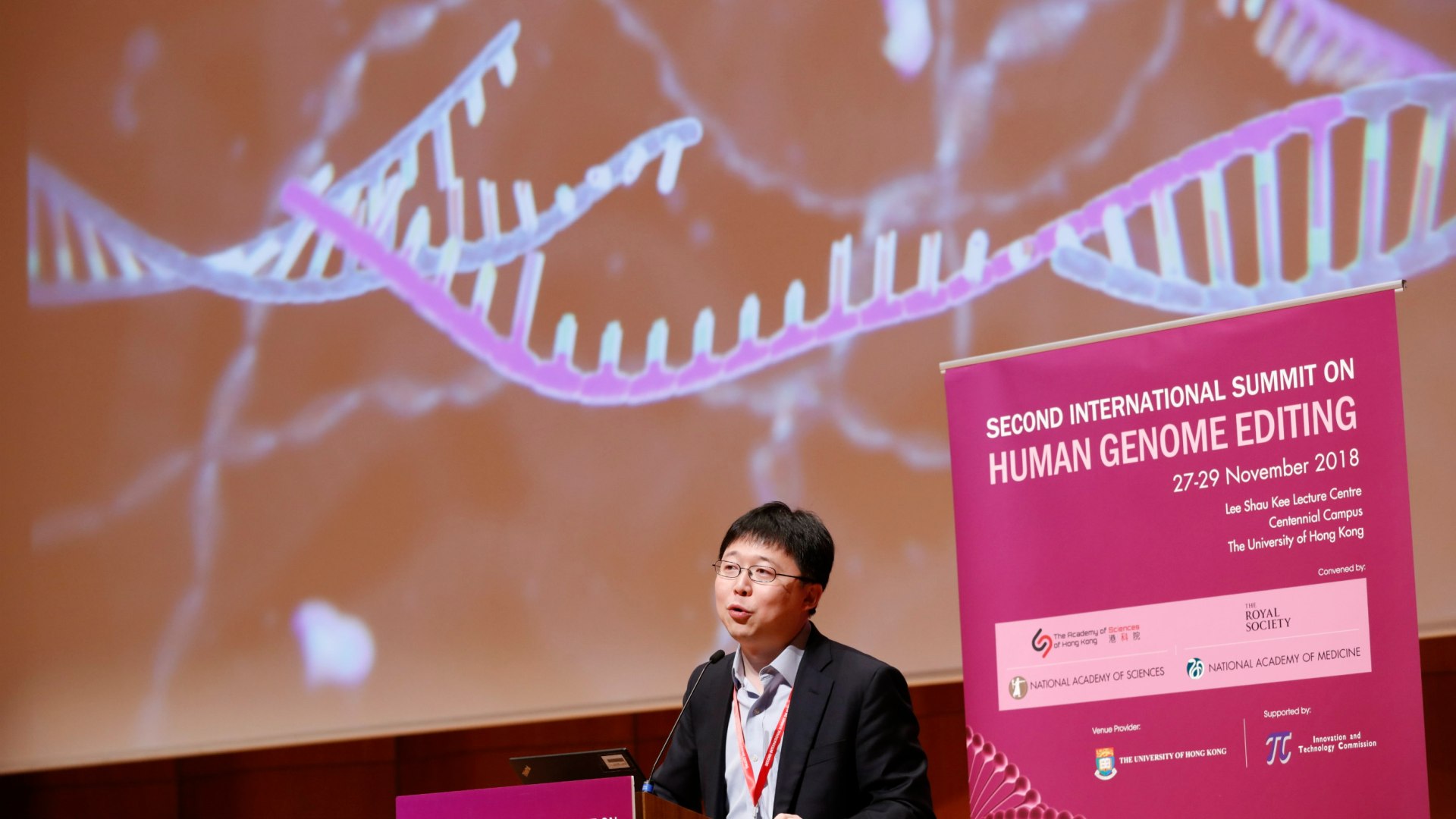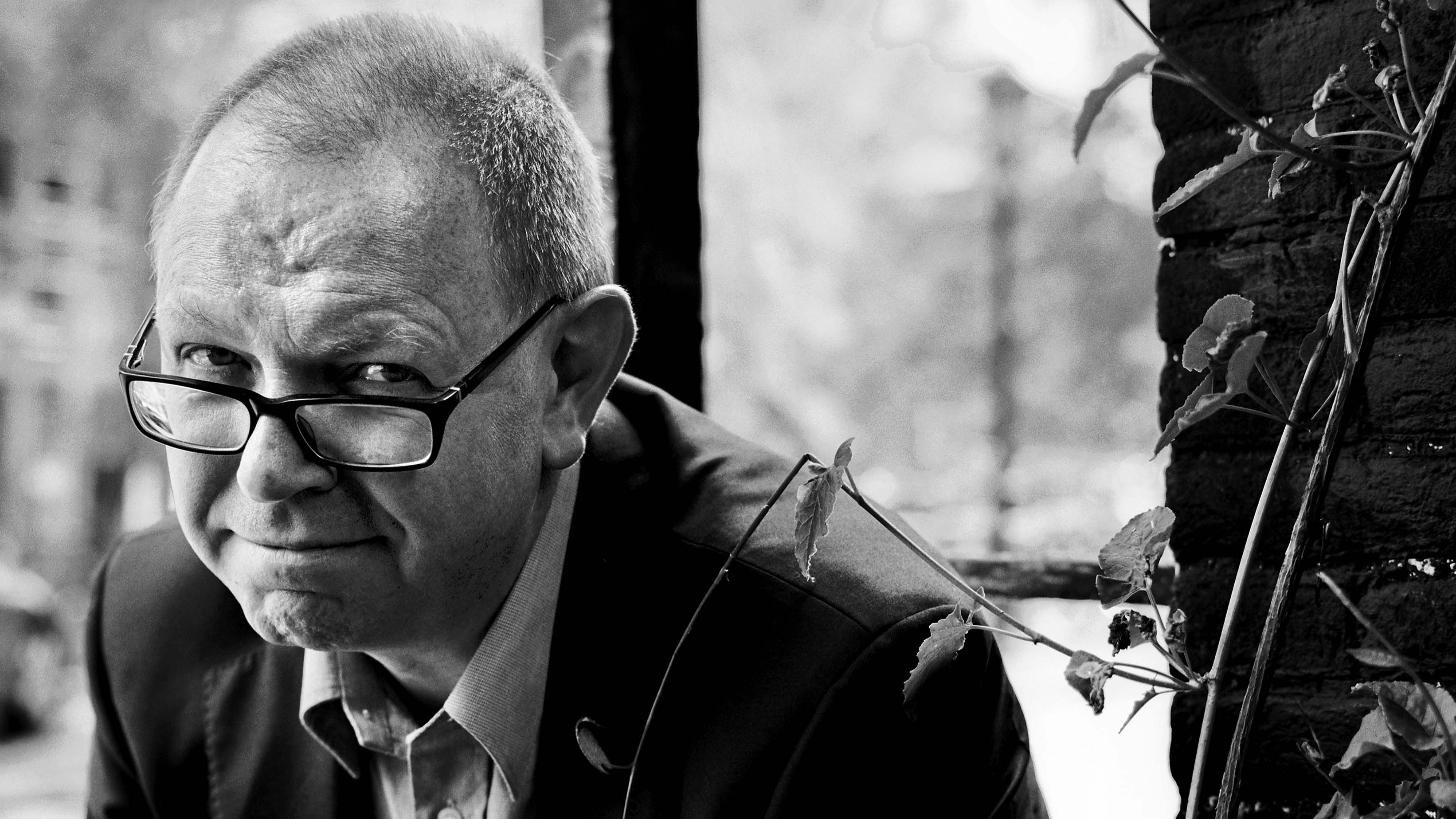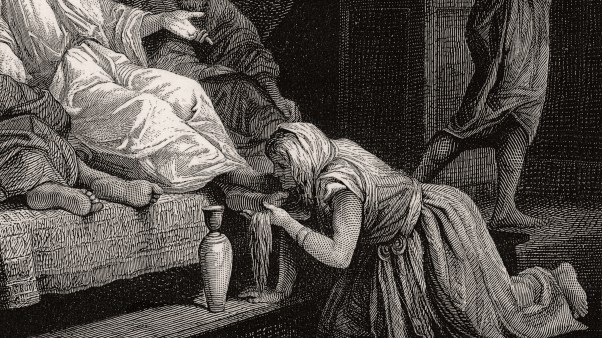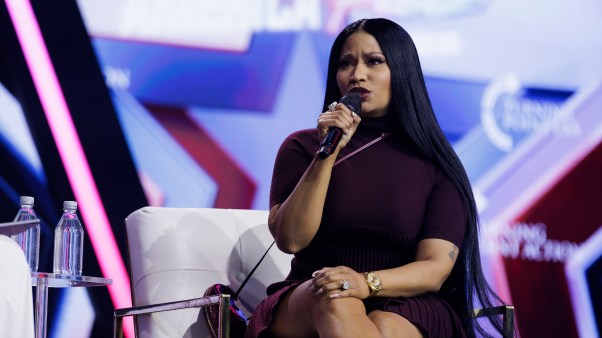Christians around the globe share concerns about the application of fast-advancing gene-editing technology, making them more cautious about the research and its potential application to alter a baby’s genetic makeup, according to a new survey.
Trevor Stammers, bioethicist and former chair of the UK-based Christian Medical Fellowship, called gene editing “arguably the most significant medical advance of the millennium to date” and said, “it is certainly here to stay.”
As the gene editing has moved from possibility to reality, this year the Pew Research Center found that across 20 countries, most people are open to using the technology to treat disease in babies.
The team of researchers that developed CRISPR “scissors”—a tool to insert, replace, and remove particular segments of cell DNA—won the 2020 Nobel Prize in chemistry, and scientists are already discussing possible uses of gene editing in response to the COVID-19 pandemic.
The bioethical concerns around editing human DNA aren’t as familiar to everyday Christians as abortion and assisted suicide, medical ethicist Daniel J. Hurst told CT, but they are growing more urgent.
In 2018, a Chinese scientist performed experimental gene editing on a set of twins, altering their DNA to increase their resistance to HIV. Members of the scientific community condemned his methodology and urged researchers not to put “the technical cart before the ethical horse,” recounted Hurst, a Christian and the director of medical professionalism, ethics, and humanities at Rowan University.
Those with a special concern for upholding life and honoring God’s creation tend to approach this field of research with additional unease.
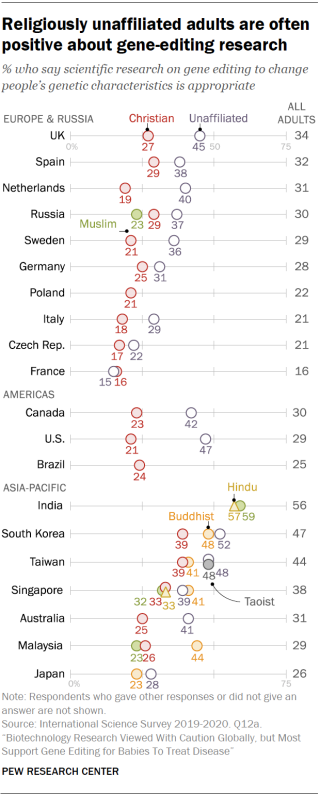
Francis Spufford's first book—The Chatto Book of Cabbages and Kings: Lists in Literature—was published in 1989, the year he turned 25. "Not surprisingly," Spufford wrote in the introductory essay, "the first response to a good list is often one of undifferentiated delight at the apparently universal reach displayed, at the pyrotechnical aspect of a device that can marshal so much so concentratedly." Much the same could be said of Spufford's subsequent career as a writer: each book a surprise, unpredicted by its predecessors, yet the whole hanging together, defying probability.
His latest book, Unapologetic: Why, Despite Everything, Christianity Can Still Make Surprising Emotional Sense, was published in the United Kingdom in 2012 and in the United States in the fall of 2013, earning a 2014 CT Book Award in the Apologetics/Evangelism category. On his U.S. book tour, Spufford visited the offices of CT for a conversation with Books & Culture editor John Wilson.
When CT editors first suggested this conversation, it was framed as a debate between American apologist William Lane Craig and you. I was happy to moderate, but my reaction was, "What are they going to debate about?" It seems to me that you and he are doing different things. There are people whose job it is to get up and debate Richard Dawkins and such; that's a good thing to do, and Craig does it superbly. They're bringing a certain toolkit that's different from your toolkit, but you're not saying to them that their brand of apologetics has passed its sell-by date. Was I right about that?
Yeah. I'm not here to say, "From now on, apologetics shall be conducted in this wishy-washy language of art." Had [Craig and I] had that conversation, we would have turned out to be more complementary than competitive. But we do have disagreements, some of which can be explained by the different settings in which we're situated. So, for instance, Craig's Reasonable Faith talks about reason offering a rational justification for the truth claims of religion. In my setting, I see reason as having an important but slightly different and smaller role. It's just not the case in Europe that large numbers of people are up to argue about the truth claims of religion.
What we need in Europe is to push back against the idea that religion is so farfetched that it's not worth talking about. For me, the job of dialectical reason is to cut up—lightly, suavely, and wittily—the claim that that the center point of probability in the discussion isn't even agnosticism anymore; that all sensible people have to be atheists; and that the burden of proof is entirely on religion, because it makes such freaky and bizarre claims that believers have all the credibility of the tooth-fairy mob.
I want the center of the argument pulled back toward agnosticism, so that it's possible to say that atheism and faith are both necessarily leaps into the dark. I'm not saying we're stuck with fideism—you just make your choice, and you know nothing. I'm saying knowledge can't take you all the way on either side. Which is why I would respect a deep, emotional conviction of the absence of God in an atheist, and why I would hope an atheist [would] respect my deep emotional conviction of the presence of God.
I don't really believe that the truth of Christianity can be demonstrated in public by logical tools. What can be done is for false claims about the improbability of Christianity to be pushed to one side, so that we have, once again, a clear space in which the conversation can happen.
In connection with the recent 50th anniversary of C. S. Lewis's death, I've also been thinking about a quote from his friend Austin Farrer, who was assessing Lewis's legacy. Here it is:
The day in which apologetic flourishes is the day of orthodoxy in discredit; an age full of people talked out of a faith in which they were reared. . . . Where the erosion of orthodoxy has gone beyond a certain point, other champions and different arms are called for. There can be no question of offering defenses to positions which are simply unoccupied; or justifying ideas of which the senses never dawned on the mind.
That is the contemporary European situation, where justification and defense are the wrong tools. What you need is a quiet, imaginative introduction of those things in the first place. You need to appeal to people's existing knowledge about their lives. You need to say, "This stuff, far from being the far-off stereotype of which you have only distantly heard, is actually a recognizable way of talking about the heart you already possess."
Yes. What you say makes me think of several writers—British, European—who are far indeed from being Christian but whose books, whatever their intentions, may open some readers to the possibility of faith. Let me give two examples. I don't know if they are people you've read or care about, but one of them is a crazy, brilliant guy named Charles Stross, who writes novels that are not reviewed in The New York Review of Books and alas probably never will be.
I'm a faithful reader of Charles Stross.
Wonderful! You're a kindred spirit. Then you'll remember the passages where Bob, the protagonist of the Laundry Files series, tells us he used to be an atheist, and he was lot more comfortable then.
He's being pitch-forked into a horrible Lovecrafty basement, full of demonic things with tentacles.
Exactly. As he puts it, if somebody had told him there was any such thing as magic, he would have thought, This person is just a fool. So his encounters with soul-sucking pretas function as a kind of reality therapy: he's forced to acknowledge these realities that weren't conceivable in his smug atheism. He refers ironically, in capital letters, to the One True Religion, which acknowledges the existence of these malign forces. They're coming to get us, but in the meantime we try to hold off their minions while we can.
Well, it's very funny, and of course he's also a genius of parody, but it's not just funny, because it's intended to puncture a complacency. Now along with this, he's scathing about Christian faith.
Oh, yeah.
But he's also scathing about the cultivated, European mindset; his view is that the world is actually much nastier than you think.
The second example is Roberto Calasso, an urbane Italian polymath, a publisher, and the author of many books. I've read almost all of them, and I'm still not sure exactly what he believes. He seems to be a really sophisticated Neo-Pagan. When he talks about the gods rustling around, he's provoking his complacent secular readers. At the same time, he abhors the crudity of Christians with their monotheism.
Stross, Calasso, and others we could name agree on one salient point: The world is different from what secular reason tells us. They're saying, "This notion of the world you have, that you assume is shared by all enlightened people, is wrong." Does that resonate with you?
Yes. It absolutely does. I mean, Stross is, with every conscious fiber of his being, a thoroughly enlightened, distinctly anti-Christian European writer, and for that matter sort of anti-Judaic writer as well (I think he's a completely secularized Jewish guy). As far as he's concerned, every moral commitment he has—to equal rights of various kinds, and issues to do with sexuality, and so on—makes it completely impossible that he could ever give the time of day to this barbarous Christian stuff, with its well-known one-book, anti-pluralistic biases.
Right!
But he is also omni-interested, and extremely clever, and constantly nibbling away at all directions, and so long as he can tell himself these things are just fascinatingly different mythological operating systems, he's very interested in burrowing into them. And as you say, he keeps coming back to this picture of the world in which you have your rational, enlightened surface with lots of other dangerous stuff going on underneath it.
Calasso I know less well, but the way he does mythology seems to me to be so suave and Italian. On the other hand, that, too, is operating from deep within the European psyche. It is feeling the pull back toward the pre-rational.
Yeah.
It makes me think of the joke about reality having a well-known liberal bias: one could also say that reality has a well-known theological bias. I think it's observably the case that our understanding of the world is just not exhausted by talking about our daylight enlightened systems, our best intentions, our codes of law and science, the things that in the bright light of noon we want to be true about ourselves. There's all the other stuff, too, and anyone who is paying attention keeps tripping over it. You get back onto theological ground no matter what your opinions are.
I think you're absolutely right. There are a couple passages in the Laundry Files where Bob talks about praying, and he says, "Of course I know it's ridiculous, but I do it anyway," and then he repeats the line I mentioned earlier: "I was much happier when I was an atheist, you know."
He also says at one point, "I believe in a God, I know he's coming, and I'll be waiting for him . . . ."
. . . with my shotgun."
In some respects, the way you describe things in Britain is not so different from the way it is over here, in what you might call elite culture.
I agree. You can find within the States places that are much more like secularized Europe. I do see that here, too, Christianity talks across a gulf when it is trying to reach where some people live. I think it's a differently constructed gulf from our European gulf, but perhaps gulf-hood is something that it's got in common there.
I have asked myself whom Unapologetic is for in America. Again, it's supposed to be primarily for those who don't believe, not those who are in a state of settled, happy hobbyist anti-theism, but those who are curious but have never really felt that thing over there called religion reaches out to where they live.
There's an irony in this, because in Britain I hear far more about [the book's] adventures among those who already believe, because they're the ones connected into the same network as me. I hear back from them, so I know it gets read in a way that has maybe helped refresh the faith of people who are already committed.
I know it works as a discussion book among those who are already committed, but I only get a few little twinkling data points from out there in the void that tell me what it's doing among people who aren't Christians.
One of the things that's so interesting about books is the way they take on a life of their own. I loved your memoir The Child That Books Built. In one passage, you talk about being in a bookstore, dazzled by the manyness of it: that there are all these ways of seeing the world just on one shelf. That resonated a lot with me. There are readers out there who, right now, are not interested in Christianity, who someday will be in a place where there are books, and it will be precisely the otherness of your book that will attract them to it.
Which is one of the powers that books have; the way that they solidify viewpoints other than our own, emotional and mental traveling into the far unknown and the near unknown, both in fiction and in nonfiction. There is a connection between The Child That Books Built and Unapologetic. I tend to be interested in things in practice, and there is surprisingly little written about the experience of reading when it is the stuff of most bookish people's lives. We fast-forward through the discussion of what reading itself is like, and just treat it as this transparent portal that opens out in the book, and then we just talk about the book. The shared experience, which is the reading, goes unsaid. In the same way with Unapologetic, it was a bridge of experience I wanted to construct. I'm interested in the way faith is experienced in life. The way it lives in daily experience, and metamorphoses there, and manifests itself in forms that are not always polite or tidy, but that are nevertheless the stuff of real commitment.
It seemed like the most natural thing in the world to try and talk about the experience of belief rather than belief itself. Again, not fast-forwarding through how we feel it and where we feel it, straight to the thing felt, but to try and talk seriously about where it lives in a life, and on what terms. Which is also, I hope, where you get common ground with people whose lives are very different.
That attentiveness to "the experience of belief" comes through very strongly.
As I said, it seemed like the most natural thing to do, but it is quite difficult as well. It requires you to give a textured internal accounting of something that is as real as Wednesday, but is as hard to get at as the movements of the soul. Once you start doing it, you start noticing glimmers of it all over the place. Some of what I'm doing in the book is also just the very traditional Christian thing of finding contemporary ways of re-describing permanent things. There's a perennial problem with familiarity crusting things over.
You have to make it strange.
Yes. You have to take your scrubbing brush and take off the superficial coating of familiarity so you can see how strikingly strange it is.
You do that beautifully. I'm thinking especially of the chapter called "Hello, Cruel World." In the eyes of many people looking from the outside, Christianity is about complacency. You say, "No, it's about hope for a change that is so good it's almost unbelievable, and sometimes it is unbelievable to us, and yet that's where we put our trust."
Christianity is a religion of continuity and discontinuity as well. It's about what stays the same and what changes in the twinkling of an eye. Both are necessary truths, but sometimes it's important to accentuate the discontinuity, the sudden leap, the way you go up a tree, Zacchaeus, and come down a saint. Otherwise, the stereotype about complacency isn't being properly challenged. Christians are as subject to complacency as anybody else, and we can certainly settle into repetition and forget that something radical and extraordinary is being asked of us as well—that we hold to an extraordinary promise about how, from moment to moment, something enters the world and enters us, after which everything is different. I wanted to bring to the front the way in which it promises the break of grace rather the continuity of law. Both are true, but both do not get equal coverage in the minds of those who haven't really thought about it.
One word that crops up among younger evangelicals these days is radical. A true Christian life is radical. You've just said that very well. And yet—so it seems to me, at least—the way the rhetoric of "radical" plays out in everyday life often leads to distortions. It isn't true to the quotidian, so some spiritual double-bookkeeping ensues. "We are radical, we are radical." How long can we be radical? You read about the radicals in the 1960s and find out they couldn't be radical for a whole week.
For my money, the way you negotiate this tension is just right. We fail repeatedly, yet at the same time you don't neglect the hope we share, the mending promised in Acts 3:21, that is absolutely essential. But you can't talk about it all the time. That's just like saying we are going to be radical all the time.
If we ask to be radical all the time, it often seems to be not just rushing past the quotidian, but rushing past our own distinctly pitied and cracked nature. We don't get to be weightless like that because we are, most of the time, in need of a much more humble and ordinary repair job.
That's beautiful.
In the chapter where I have to produce a kind of one-chapter New Testament for people who've never come across it, the reason why I have Yeshua, my de-familiarized Christ, saying, "Far more can be mended than you know," which I think is actually true to the New Testament, is that I want mending. Not flying free, not transformation, but humble, ordinary, everyday, get-you-back-on-your-feet mending, to be at the center of the Christian story.
When the book was being translated into Dutch, the translator sent me an email: "This word mend, I've looked it up in the dictionary, and it seems to be the same word you use for repairing bicycles. You must mean something else."
I wrote back, "No. No. No. I want the bicycle-repair word." What I absolutely want is to suggest that before it's anything else, redemption is God mending the bicycle of our souls; God bringing out the puncture repair kit, re-inflating the tires, taking off the rust, making us roadworthy once more. Not so that we can take flight into ecstasy, but so that we can do the next needful mile of our lives.
Christians in the US are half as likely as the religiously unaffiliated to believe scientific research on gene editing is an appropriate use of technology (21% vs. 47%), the widest gap among the countries surveyed.
Believers in Canada, the UK, the Netherlands, Sweden, Italy, and Spain also lagged behind the unaffiliated, though both demographics disapproved of gene-editing research.
In France, where approval levels were lowest, Christians and the unaffiliated felt about the same (16% vs. 15% said it was appropriate).
Few people, regardless of faith, considered it appropriate to alter genetic makeup to make a baby more intelligent; overall, 82 percent disapproved.
But many believe scientists should work on gene editing to prevent or cure diseases, even if that means using “germline editing” techniques that alter the DNA in a human germ cell (an egg or sperm) or an embryo.
“Most gene editing researchers see the creation and destruction of embryos as an intrinsic necessity … and many Christians will find this unethical—the end point here being neither healing nor enhancement of the embryo involved,” wrote Stammers.
In the UK, the Christian Medical Fellowship spoke out against a decision by the Human Fertilisation and Embryology Authority decision to allow genome modification of human embryos fertilized through in vitro fertilization.
But some Christians also see a case for CRISPR technology as a tool for healing.
In a US survey CT covered in 2018, Pew found that 61 percent of both white evangelicals and black Protestants said gene editing to help cure a disease at birth was an appropriate use of medical technology, while fewer were comfortable with the idea of using gene editing to reduce disease over a lifetime. Around half of black Protestants and 45 percent of white evangelicals approved of using it for future conditions.
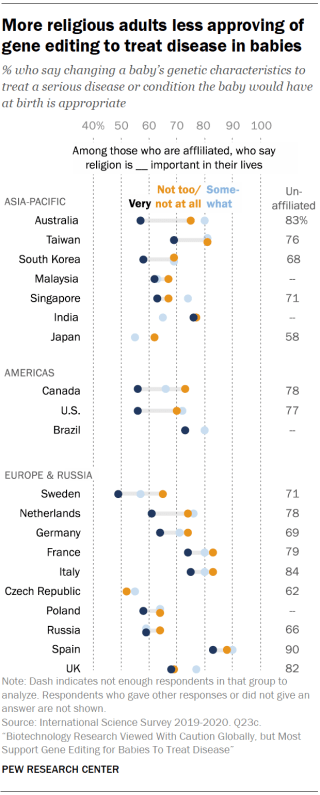
In the 2020 report, a median of 70 percent of people across the 20 countries said they approved of gene editing to treat congenital conditions that babies would be born with, and 60 percent approved of using it to reduce the risk of a disease that could develop later.
Majorities of believers who considered religion very important to them approved of gene editing to treat disease at birth, though people who said religion was less important were even more in favor of the treatments.
“What I think is still missing is solid theological reasoning, within the Christian community, about CRISPR. Why exactly does the doctrine of the imago Dei mean that we should be wary about germline editing?” said Nathan Barczi, executive director of The Octect Collaborative and associate pastor of Christ the King Church in Cambridge, Massachusetts.
“If CRISPR could be practiced and developed without the destruction of human embryos, would that make it okay? Does our concern for the sanctity of human life apply to the unborn (as it should!) only, or does it extend more broadly to that, to how we think about what it means for ourselves and our fellow humans—with all of our limitations, constraints, and differences—to be fully human, bearing God’s image?” said Barczi, who previously wrote about gene editing for CT. “I think there’s lots of work left to be done there.”
Jason Thacker, chair of research in technology ethics at the Ethics & Religious Liberty Commission of the Southern Baptist Convention, agrees. He sees Christian formation around the sanctity of life and the call to love God and neighbor as the basis of the church’s response to potential issues in biotechnology.
“The church needs more people steeped in these truths and speaking clearly to the pressing ethical issues surrounding all forms of technology,” he said. “It will take a concerted effort from all of us to raise awareness about the life-altering issues at stake in these debates.”
Age is consistently a factor in how people approach gene editing. Younger people across the countries surveyed were more open to the technology than older populations.
Pew also found that, in most countries, between a third and half of Christians say their religious beliefs conflict with science.
The perceived disparity between faith and science was highest in parts of Asia, with 64 percent of Christians in South Korea and 58 percent of Christians in Singapore reporting some conflict. It was lowest in Sweden, where just 15 percent of Christians saw conflict.

